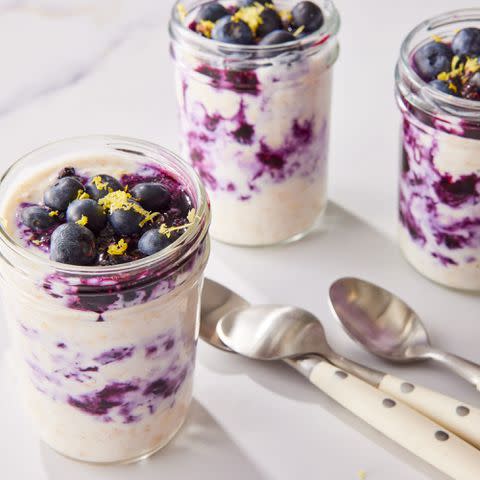Reviewed by nutritionist Ani Nguyen, Massachusetts, Rd
Key points
-
The mind -rich mind diet can reduce the risk of Alzheimer’s and dementia.
-
Leaf greenery, eggs and salmon can help maintain memory and general brain function.
-
Blueberries, lamb and nuts offer nutrients that maintain the knowledge and overall health of the brain.
The brain is the control center of your body, responsible for movement, thought, emotion, breathing and more. Since the brain has such a great deal, it is imperative that we give it an abundance of fuel and nutrients to help it function properly and remain healthy. The foods we eat play a huge role in the structure and health of our brain. Foods rich in vitamins, minerals, antioxidants, flavonols, polyphenols and omega-3 fatty acids can help improve memory, cognitive function and overall health of the brain.
In addition, studies show that following the diet of the mind, blurring the Mediterranean diet and dash diet that promotes the nutrition of specific foods, can help reduce the risk of Alzheimer’s disease and dementia. Many of the foods we have included here are on the list of the best foods of the brain of the mind. Here are six things to eat for better brain health.
Photographer: Jen Cauci, Food Stylist: Julian Hensarling, Style of Staff: Lydia Purcell
In the photo recipe: Anti -inflammatory strawberry salad and kale with storm
1. Leaf green
Leaf foliage, such as cabbage and spinach, are filled with nutrients, including vitamin K, beta carotene (precursor to vitamin A), folate and vitamin E. Vitamin E is an antioxidant that protects cells from free radical damage and is associated with the prevention of cognitive decline in the outdated population. Vitamin K and beta carotene are also associated with improving brain health, helping to prevent memory loss and improve knowledge. Increasing the intake of leafy green should not be difficult. You can try adding a handful of green when you are preparing mashed or adding greenery to your favorite cake recipe.

In the photo recipe: Inspired by Greek burgers with herbal-fette sauce
2. Lamb
Are you a fan of Lamb? If so, you may be surprised to understand that lamb is related to benefits like long -term knowledge. One study suggests that the weekly consumption of lamb-but not other red meat-can be associated with improved long-term knowledge. A 10-year study has noted improvements in the results of liquids in people who consume certain foods, including lamb. Lamb is produced in every country in the United States and is available throughout the year, which facilitates it to your diet. Try to add lamb to your favorite stew recipe or grill it.

In the photo recipe: Spinach and mushrooms kish
3. Eggs
Eggs are one of the most popular foods for breakfast – and for good reason. They offer many health benefits, especially in terms of brain health. Regular consumption of eggs is associated with reduced memory loss in adult adults, according to studies. Eggs are one of the best nutritional sources of choline that can maintain brain function, helping to maintain memory and communication between brain cells. Although eggs are usually served at breakfast, you can enjoy any meal. Try using eggs to make a spicy dinner.

4. Salmon
Salmon is usually known as a great source of protein, but did you know it is great for brain health? Fat fish such as salmon are high in omega-3 fatty acids, which are crucial for the development and function of the brain. In addition to the improved brain health, these fatty acids are associated with a decrease in the risk of heart disease and arthritis. Salmon can be prepared in different ways. It can be baked and paired with a hearty portion of vegetables or added to your favorite pasta dish. Our five-star walnut rosemaride salmon (pictured above) will help you enhance your delicious reception of Omega-3 in a delicious way.

Rachel Marek, Food Stylist: Holly Dresman
In the photo recipe: Lemon-gray for one night oats
5. Blueberries
Although all fruits are beneficial for brain health, blueberries are at the top of the list. They contribute to the essential nutrients for the body, including vitamin C, vitamin K, manganese and phytonutrients. These nutrients help stimulate blood flow and oxygen in the brain, leading to improved concentration. Studies show that eating blueberries can help maintain cognitive function and reduce the risk of dementia in certain people who can be at higher risk. There are many ways to enjoy this delicious fruit – try adding a handful to your puree recipe or puree a few berries to make a delicious blueberry chia.

Photographer: Hamie Lee, Nutritional Style: Emily Vrabos Hall, Stylist of Stock: Christine Kieli
In the photo recipe: Seasoned nuts
6. Walnuts
Nuts are a great addition to any diet regimen, but the one that contributes most to the health of the brain are nuts. In fact, studies show that eating about 1 to 2 ounces of nuts a day can improve cognitive function. This is because they contain an excellent source of alpha-linolenic acid (ALA), which is a plant base omega-3 essential fatty acid, which helps to counteract cognitive decline by suppressing inflammation and oxidative stress. Inflammation and oxidative stress are related to Alzheimer’s disease and dementia. Try to add a serving of nuts to your heart salad or pair them with a variety of roasted vegetables.
Our expert takes
The foods you eat play an important role in brain health. You can help improve your cognitive function, memory and alertness by including a variety of foods such as leafy foliage, lamb, eggs, salmon, blueberries and nuts in your daily diet. These foods can also help reduce the risk of age -related neurodegenerative diseases, such as Alzheimer’s dementia and disease.
Read the original article about Eathell